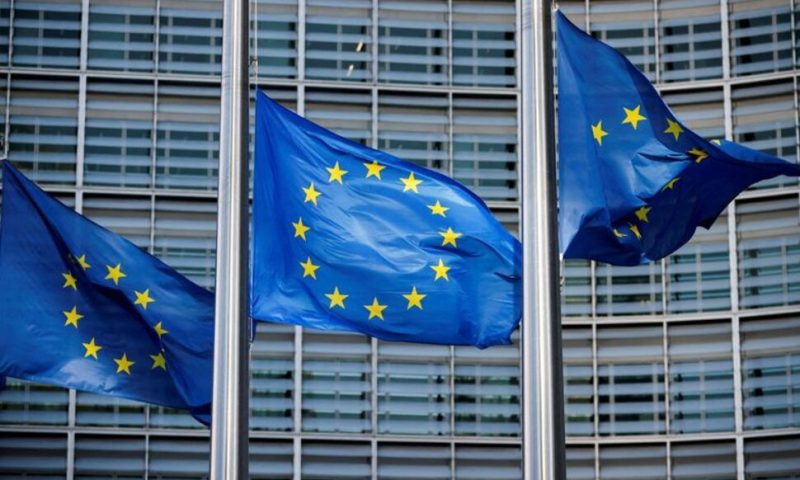BRUSSELS – The European Union risks being left behind by the United States, China and other rivals in the global shift to new technologies if it fails to radically improve the competitiveness and dynamism of its economy.
That is the consensus view of economists, business and many of the EU leaders meeting on April 17-18 to discuss how to drive the economic growth needed to maintain the bloc’s championing of living standards and climate change action.
They are set to call for a “New European Competitiveness Deal” – which may give some a strong sense of deja vu after the growth-focused Lisbon Strategy of 2000 and the Europe 2020 plan that came a decade later.
What is different now is the disruption of new technologies, from artificial intelligence to zero-carbon manufacturing, China’s rise up the value chain, increased protectionism and the loss of cheap Russian gas on which EU industry had relied.
Zach Meyers, assistant director of think tank CER, said the EU’s problem was twofold, with growth stubbornly lower than that of its rivals and a lack of dynamism and innovation to adapt.
“The focus needs to be less on ‘saving’ existing industries and more on making the EU economy resilient and innovative.”
A McKinsey report shows Europe is a champion on tackling climate change and on metrics such as income equality and life expectancy, but a laggard on growth.
It sees a competitive edge increasingly coming from 10 frontier technologies, such as AI and biological innovation, of which Europe has a leading position in only two.
EU leaders were jolted 18 months ago by the U.S. offer of nearly $400 billion of green tax breaks linked to local production as part of its Inflation Reduction Act (IRA).
But when a counterweight joint European Sovereignty Fund was proposed, frugal EU members blocked it and the bloc settled instead for a scheme involving a modest 10 billion euros ($10.6 billion) of new money.
Looser state aid rules have allowed single EU members to support new production, such as the reported 15 billion euros Germany put forward to lure chipmakers Intel and TSMC.
That largesse has prompted pro-free market countries such as Sweden, however, to warn of a damaging subsidy race between EU members.
The International Monetary Fund has warned too that tax breaks and subsidies were not magic cures for slow growth.
ExxonMobil Europe president Philippe Ducom said subsidies would not fund the huge investments required for the energy transition and Europe needed to create the business case for the private sector.
He cited regulation adding costs and an overly prescriptive approach, such as insisting hydrogen be made with renewable energy over other methods of carbon-neutral production.
“The IRA focuses on the What and leaves the How to the market participants…. Europe stipulates the What and the How, and right now there is no business case,” he told Reuters.
“Ultimately, limiting the options will increase the cost to the consumer and slow down the transition.”
SINGLE MARKET UPDATE
Amid an undercurrent of debate about subsidies, EU leaders will focus on the single market, a bedrock of 30 years of EU prosperity but one in need of improvement.
There is general consensus that the single market operates well for goods but far less well for services and other intangibles.
A starting point will be a report by former Italian Prime Minister Enrico Letta, who told Reuters he would place a special focus on small businesses and on fostering exchanges of know-how across the bloc.
“It is time for the single market to deal with intangible things such as data, education, skills, research, innovation,” Letta said.
Simone Tagliapietra, senior fellow at the Bruegel think tank, said the single market should be the number one focus, given the importance of scale to compete in new technologies.
“We’re in a world where size matters,” he said. “The greater the single market, the more our companies achieve economies of scale to be able to compete with other economies of the world.”
EU leaders will set out a nine-point plan, including deepening the single market and creating capital markets and energy unions, according to draft conclusions.
There are echoes of past EU growth drives, notably the 2000 Lisbon strategy which set the goal of making the bloc “the most competitive and dynamic knowledge-based economy in the world”.
Analysts said much of the diagnosis and proposed treatment made sense but the EU had failed to follow the prescribed course of action such as creating banking and capital markets unions.
EU countries were reluctant to make the trade-offs required, such as opening up established local suppliers to competition, with only long-term returns and benefits not evenly distributed across the bloc. There also appeared to be little sense of urgency.
That has changed, Tagliapietra said, suggesting that the EU might finally act.
“Now it’s more pressing for Europe to clean up. Unless we are able to clean up we are not going to be competitive and we will all lose to players like China and America.” ($1 = 0.9397 euros)

